
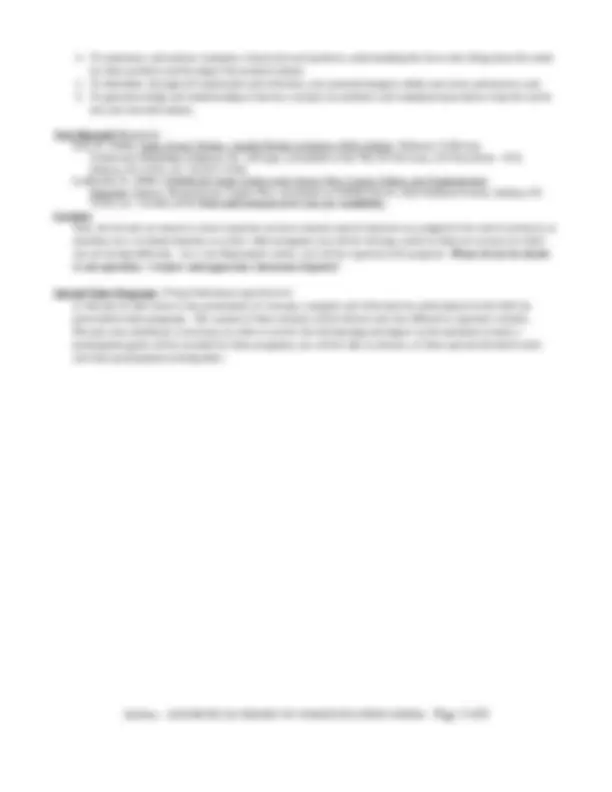
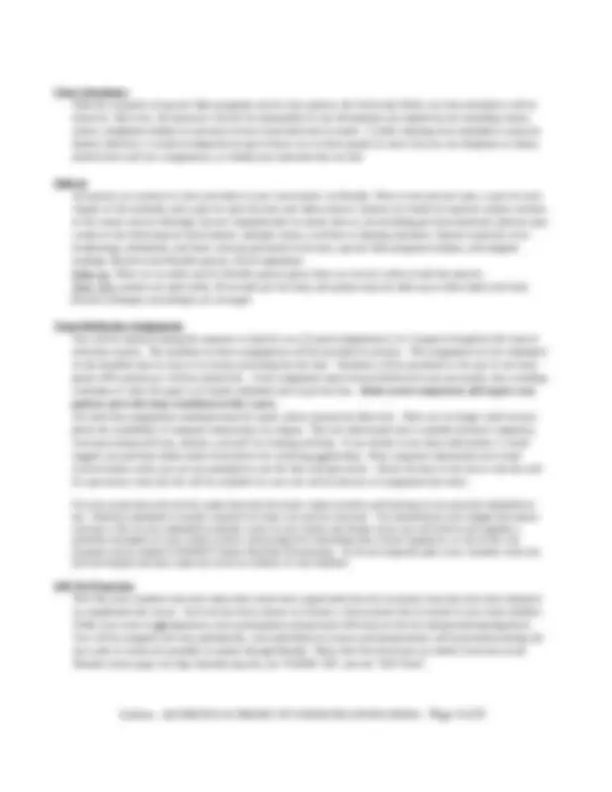
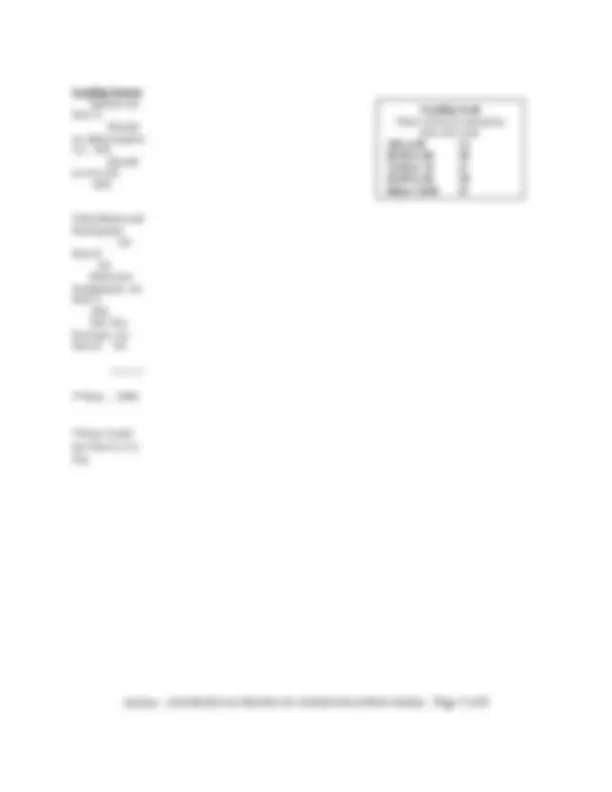
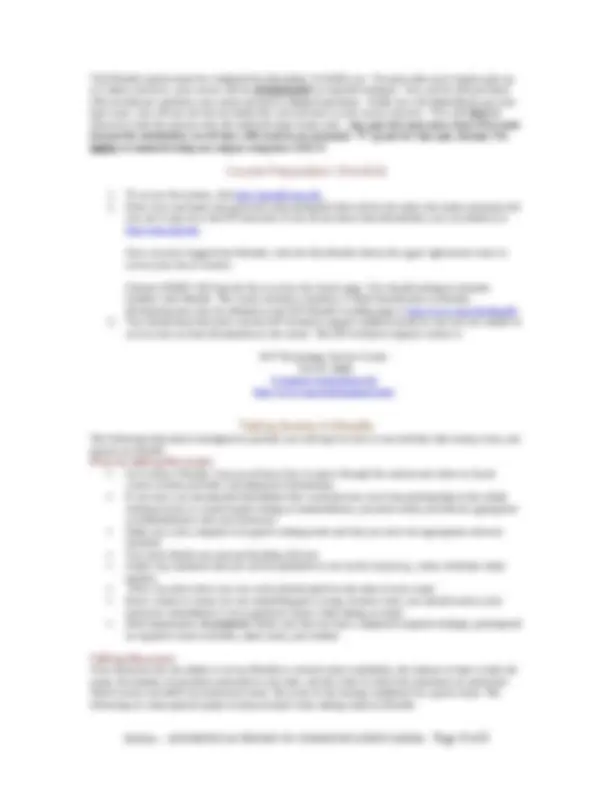
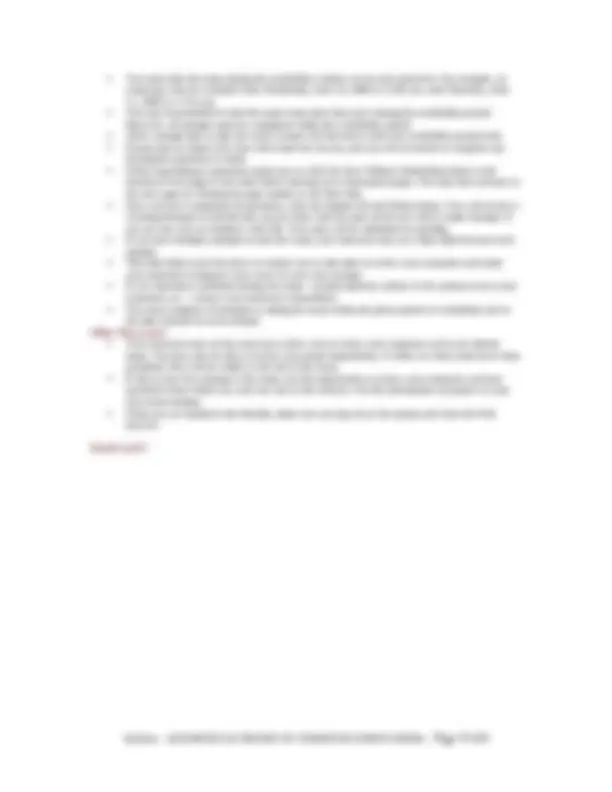


Study with the several resources on Docsity

Earn points by helping other students or get them with a premium plan


Prepare for your exams
Study with the several resources on Docsity

Earn points to download
Earn points by helping other students or get them with a premium plan
Community
Ask the community for help and clear up your study doubts
Discover the best universities in your country according to Docsity users
Free resources
Download our free guides on studying techniques, anxiety management strategies, and thesis advice from Docsity tutors
Material Type: Exam; Professor: Lamberski; Class: Aesthetic&Theory of Comm Media; Subject: Communications Media; University: Indiana University of Pennsylvania-Main Campus; Term: Fall 2010;
Typology: Exams
1 / 9

This page cannot be seen from the preview
Don't miss anything!






Syllabus for Aesthetics and Theory of Communications Media " The Classical and Contemporary Images that Influence Communications " COMM150 - 3 credits; Prerequisite: COMM Department of Communications Media, Indiana University of Pennsylvania Class Meetings Fall 2009 (Course duration: Monday, August 31 to Monday, December 14) Section 1 (CRN=11884) – 1:25pm-2:15pm; Room G-7 Stouffer Hall Special dates (Estimated as best I can!): Aug. 31 Drop/Add Begins Sept. 6 Drop/Add Ends Sept. 25 D/F Repeat forms due in Registrar Office, Clark Hall Oct. 12 Pass/Fail forms due in Registrar Office, Clark Hall Nov. 4 Individual course withdrawal deadline (See “Grading System: Withdrawal Grades” later in the syllabus) Nov. 13 Total semester withdrawal deadline Nov. 15 Deadline to apply for May 2010 graduation (Careful of degree confirmation) Dec. 14 Incomplete “I” grade change for Spring ’09 due in Registrar’s Office Dec. 15-18 Final Examinations ( You are expected to participate in any culminating activity! ) Dec. 20 December 2009 Commencement ( Sunday ) April 1, 2010 Deadline to apply for August/December 2010 graduation ( on URSA) Class will not be held on (See last page for a lecture grid): Sept. 7 Labor Day Nov. 21-29 Thanksgiving Break Nov. 30 Dr. Lamberski will NOT be holding class. Instructor Richard J. Lamberski, Ph.D. - Professor, Communications Media Office : 127 Stouffer Hall, IUP, Indiana, PA 15705- E-mail : rjl@iup.edu (Your IUP e-mail account is the ONLY contact system and the forwarding of IUP email is not allowed). For suggestions on Email Etiquette and Tailoring your IUP email account, see http://www.coe.iup.edu/RJL/RESOURCES/email_suggestions.htm Web Address : http://www.coe.iup.edu/rjl (see Instruction, see COMM150) Moodle Address : http://moodle.iup.edu Telephone : (724) 357- Note : My answering machine is always on, so feel free to leave a message at any time, 24 hours a day, seven days a week. I will return your call as soon as I can. Email is usually the best way to communicate with me. Office Hours Monday: 10:00am-12:00pm Tuesday: 10:00am-12:00pm Wednesday: 10:00-11:00am Thursday: 10:00am-12:00pm Friday: 10:00-11:00am For other times, please ask me!! Note : Office hours are by appointment in 20 minute blocks of time. If you need more than 20 minutes, talk to me before signing up for two or more consecutive time blocks. A STUDENT APPOINTMENT CALENDAR is posted on my office door for your convenience. If you schedule an appointment and fail to cancel that appointment in a timely manner ( hours in advance) or do not show up for your scheduled appointment, you will lose points towards your final course grade. My time and your time are limited and important. I respect and appreciate professional etiquette!
Course Description Examines the theoretical assumptions of sight, sound, and motion as applied to the design of communication products for different media formats. Within the course, strategies for creative composition are demonstrated. The psychological and physiological implications of images are discussed. Course Prerequisites (if lacking, talk to the instructor) Prior to this course you must have taken and successfully passed (C or better), one of the following: COMM101- Communications Media in American Society, JRNL1O5-Journalism and the Mass Media, or a transferred equivalent. It would be to your advantage to have had General Psychology (PSYC101). In addition, you might want to plan to take one or several of the following complementary courses before completing your degree at IUP: Principles of Economics II (ECON122), Principles of Marketing (MKTG320), and Advertising (MKTG433). Should you choose to take one of these courses, check to see if you have the necessary prerequisite(s). With good planning, most COMM Media majors acquire a Minor while at IUP. If you properly plan your curriculum, most of these suggested courses can be taken as your "Required Out of College" courses and/or as your "Free Elective" courses. For additional suggestions and information, see my web page and click on "Advising." Introduction - The Nature and Value of this Course The range of communication expression is greater than at any other time in the history of human existence, yet we still are expanding in new types of communication devices with the resultant explosion of possible new message forms. With these present and emerging devices, the ability to design messages (strategies) and deliver messages (techniques) becomes increasingly complex yet ever so challenging. This challenge is both to know the theory or science of the field and to know the range of acceptance or art of the field. As the United States becomes more of a working society of information and service industries, transforming from a historically manufacturing and agricultural labor force, the importance of realizing the full potential and range of communication images (signs and symbols) becomes more urgent and significant. The importance of this knowledge is not only significant for the future designers or producers of these images, but also for tomorrow's audience or consumers of these images. During this course, three interrelated themes will be presented concurrently. One theme focuses upon the study of the human mind, the mind's structure, capacity, and complexity to perceive, interpret, store, create, and retrieve messages. The second theme focuses on providing you, as future designers or producers of messages, an understanding of the more significant elements, techniques and devices used in composing creative and persuasive communication. This includes terminology, channel awareness and specific design and delivery elements. The third theme is to provide direct experience through observation (video programs) and discussion (class reviews) of both the classical and contemporary images of our time. These video program experiences focus on behind the scene accounts by some of the most influential communicators. Class discussions by the instructor serve to amplify significant points, clarify issues or facts, and introduce relevant information based upon personal experience or scholarly reflection. With these three themes, I hope your ability to critically review messages in the future (as an audience or consumer of communication) will be enhanced and your ability to create messages (as a designer or producer of communication) will be forever influenced. General Course Objectives (Both unique or interrelated) The course will attempt to cover, but not be limited to, the following objectives. Students should be able:
Class Attendance With the exception of special video programs and in-class quizzes, the University Policy on class attendance will be followed. However, the instructor will not be responsible for any information you missed by not attending classes unless a legitimate medical or personal excuse is provided and accepted. I realize missing class sometimes cannot be helped; therefore, I would recommend you get to know two or three people in class who you can telephone to obtain missed notes and new assignments, or submit your materials that are due. Quizzes All quizzes are external to class and taken at your convenience on Moodle. There is one practice quiz, a quiz for each chapter of the textbook, and a quiz for open lectures and videos shown. Quizzes are based on separate content sections of the course and are thorough, but not comprehensive in nature (that is, not including previous material). Quizzes may consist of the following test item formats: multiple choice, true/false or missing statement. Quizzes typically cover terminology, definitions, and basic concepts presented in lectures, special video program sessions, and assigned readings. Results from Moodle quizzes will be immediate. Make-up: There are no make-ups for Moodle quizzes given there are several weeks to take the quizzes. Note: ALL quizzes are open book, 30 seconds per test item, and quizzes may be taken up to three times (one hour between attempts) and attempts are averaged. Typed Reflection Assignments You will be required during the semester to hand in two (2) typed assignments (2 to 3 pages in length) in the form of reflection reports. The deadline for these assignments will be provided in advance. The assignment is to be submitted on the deadline date in class or in classes preceding the due date. Tardiness will be penalized at the rate of one letter grade (10% points) per 24-hour period late. A late assignment must be hand delivered to me personally, thus avoiding confusion of when the paper was finally submitted and to prevent loss. Hand scored components will require your patience given the large enrollment in this course. All reflection assignments submitted must be typed, unless announced otherwise. There are no longer valid excuses given the availability of computer laboratories on campus. The free laboratories have available personal computers, word processing software, printers, and staff for training and help. If you decide to use these laboratories, I would suggest you purchase disks and/or flash drives for archiving and backup. Most computer laboratories have both reserved times (when you are not permitted to use the lab) and open hours. Check the door of the lab or with the staff for open hours when the lab will be available for your use well in advance of assignment due dates. For your protection and records, make hard and electronic copies (archive and backup) of any material submitted to me. Material submitted is usually retained for future use and not returned. You should keep your original document and start a file of your submitted academic work; in your Junior and Senior years you will need to put together a portfolio (examples of your work) to share with prospective internship sites, future employers, or use in the core required course entitled COMM475 Senior Portfolio Presentation. So do not tragically give away valuable work you have developed and may some day need as evidence of your abilities. Self-Test Exercises Over the years students who have taken this course have appreciated the self-awareness tests that have been obtained to complement the course. Each test has been chosen to evaluate a characteristic that is related to your inner abilities. While your score is not important, your participation and personal reflection on the test interpretation is important. You will be assigned self-tests periodically; your individual test scores and interpretation will be presented during the last week of classes (if possible) or online through Moodle. These Self-Test Exercises are briefly reviewed on the Moodle course page: see http://moodle.iup.edu, see “COMM 150”, and see “Self-Tests”.
Grading System Quizzes-see Note A Moodle on videos (approx.
Final Comments
Chapter** Practice Quiz WebCT Recommended Start (12:05 a.m.) August 31 Recommended End (11:55 p.m.) September 4 1 August 31 September 4 2 August 31 September 4 3 September 5 September 11 4 September 5 September 11 5 September 12 September 18 6 September 12 September 18 7 September 19 September 25 8 September 19 September 25 9 September 26 October 2 10 September 26 October 2 11 October 3 October 9 12 October 3 October 9 13 October 10 October 16 14 October 10 October 16 15 October 17 October 23 16 October 17 October 23 17 October 24 October 30 18 October 24 October 30
*All Moodle quizzes must be completed by December 14 11:55 p.m. You may take each chapter quiz up to 3 times; however, your scores will be AVERAGED for repeated attempts. You will be allowed thirty (30) seconds per question; you cannot go back to skipped questions. While you will immediately see your quiz score, you will not see the test items that were incorrect or the correct answers. You will NOT be allowed to take the quizzes after the indicated time frame ends. Any quiz left open more than 10 seconds beyond the submission cut off time will result in an automatic “F” grade for that quiz attempt. We highly recommend using on-campus computers ONLY!
The following help sheet is designed to provide you with tips for how to successfully take exams, tests, and quizzes in Moodle. Prior to taking the exam Get to know Moodle. Log on and learn how to move through the system and where to locate course content,activities, and important information. If you have any documented disabilities that would prevent you from participating in the online testing process or would require testing accommodations, you must notify and discuss appropriate accommodations with your instructor. Make sure your computer is in good working order and that you have the appropriate software installed. You must disable any pop-up blocking software. Gather any materials that you will be permitted to use on the exam (e.g., notes, textbook, study guides). Pick a location where you can work uninterrupted for the time of your exam. Know whom to contact in case something goes wrong. In most cases, you should contact your instructor immediately if you experience issues while taking an exam. Most importantly, be prepared. Make sure that you have completed required readings, participated in required course activities, taken notes, and studied. Taking the exam Your instructor has the ability to set up Moodle to control exam availability, the amount of time to take the exam, the number of questions presented at one time, and the order in which the questions are presented. These factors will differ by instructor/course. Be aware of the testing conditions for a given exam. The following are some general points to keep in mind when taking exams in Moodle: